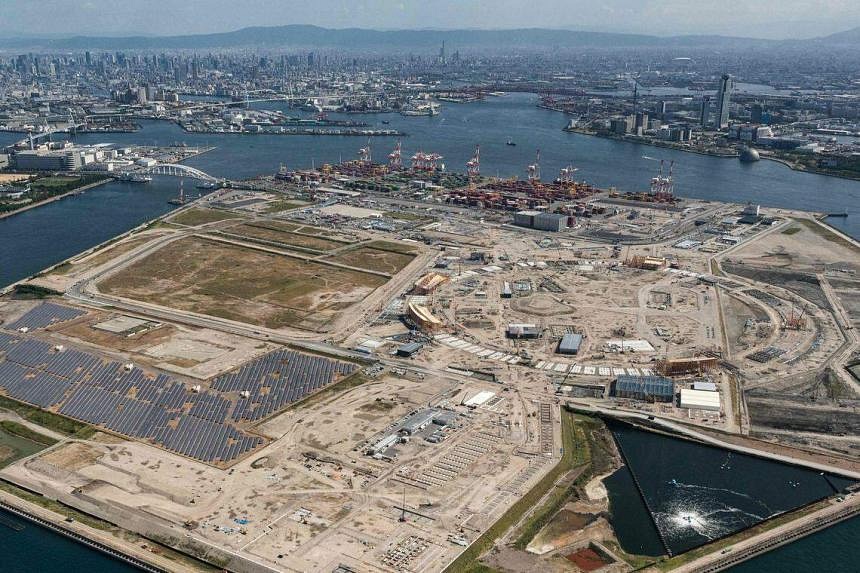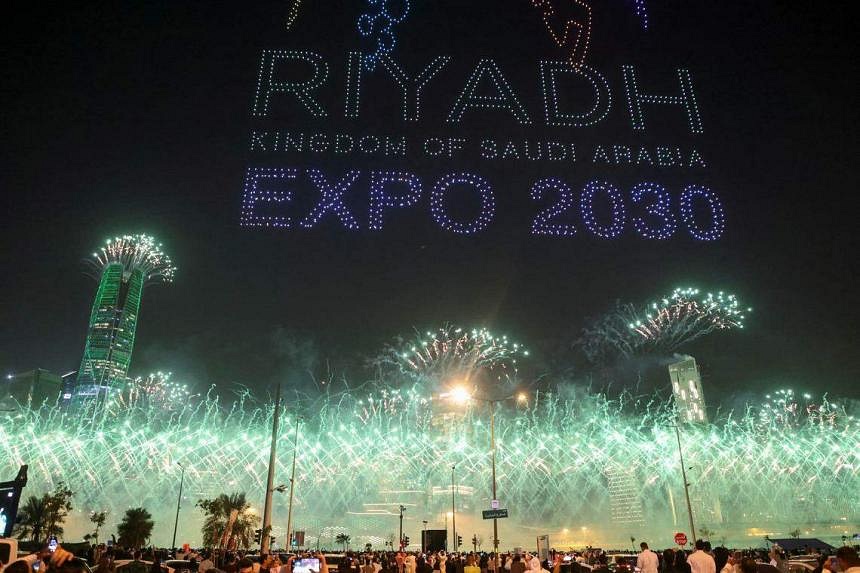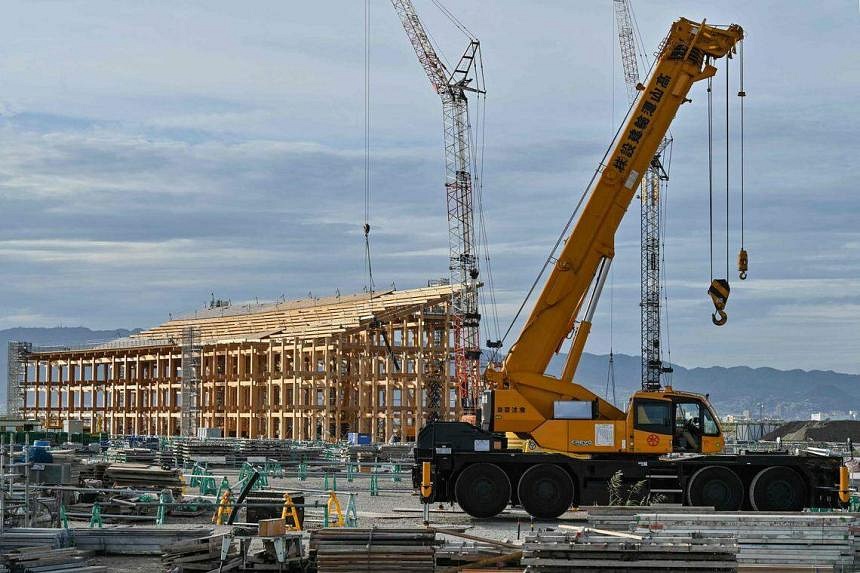TOKYO – When Osaka won the bid in 2018 to host the 2025 World Expo, many of the city’s residents were ecstatic, with some expressing the hope that the six-month extravaganza would help with the revitalisation of their Kansai region.
Now, just 16 months before the event opens, public support has flagged. Preparations for it are running way behind schedule due to construction delays and there are massive cost overruns.
The fact that Japan’s last major event – the 2020 Tokyo Games – has resulted in corruption convictions has hurt domestic appetite for global events and raised questions over whether Japan has what it takes to pull off a scandal-free affair.
There are a myriad reasons for the problems that beset the 2025 Expo’s preparations, some domestic, including political and economic ones, and others external and beyond the control of the organisers.
The organisers began advance ticket sales on Nov 30 – 500 days prior to the event – for the tourism jamboree that will be held from April 13 to Oct 13, 2025, on the man-made Osaka Bay island of Yumeshima, where Japan is also due to open its first integrated resort in 2030. Some 50,000 tickets were sold in the first week, organisers said.
Around 160 countries and regions, including Singapore, will participate, according to the Japan Association for the 2025 World Exposition.
About 60 foreign governments intend to build their own pavilions for the Expo, though only half of them have secured construction companies. While construction of these pavilions was expected to have begun by July 2023, not a single brick has been laid.
This hold-up has been attributed to delays in the submission and approval of blueprints to build temporary structures, as well as a difficulty in securing construction companies amid a labour shortage.
Adding to the bad news is the pullout of three countries, with Mexico and Estonia citing domestic fiscal issues and Russia blaming it on Japan’s opposition to the Ukraine war.
All this is playing out as the legacy of the Tokyo 2020 Olympic Games, held in 2021 after a Covid-19-induced delay, has been sullied by ongoing bid-rigging and corruption trials.
Six firms and seven senior executives are facing charges. This could be a dampener on the Osaka Expo – already it has likely contributed to deep domestic opposition, one of the factors that has damaged Sapporo’s attempts to host the 2030 or 2034 Winter Games.
On Nov 17, Ishikawa Governor Hiroshi Hase, a former professional wrestler turned Diet lawmaker who was in charge of the Tokyo bid, raised eyebrows when he said, in since-recanted comments, that “secret funds” were tapped to produce photo album gifts, each worth 200,000 yen (S$1,860), chronicling the athlete days for each of the 105 International Olympic Committee members who held voting rights.
The Games were likewise plagued by budget overruns, and auditors pegged the final cost at 1.7 trillion yen (S$15.7 billion), which was 130 per cent higher than early estimates.
The Osaka Expo is also facing a budget overrun – it has already had to increase its budget twice. In the latest revision on Nov 2, the budget was raised to 235 billion yen – more than 90 per cent higher than the first estimate.
The government later admitted on Nov 28 that this sum excludes another 83.7 billion yen, earmarked for Japan to build its own pavilion, support lesser-developed nations, and enact security measures.

Tourism expert Hideki Endo of Kyoto’s Ritsumeikan University told The Straits Times that Japan’s management of global events leaves much to be desired.
“The political mindset is still outdated,” he said, noting that there must be more transparency and accountability at every step of the process to retain support.
The woes surrounding the World Expo, compounded by the Olympic trials playing out in courtrooms, have hurt interest for large events. Media polls now show that at least seven in 10 are against the fair.
Unlike the 1964 Tokyo Olympics and the 1970 Osaka Expo that marked Japan’s coming of age, the nation’s economic stagnation has resulted in a leery public that, faced with bread-and-butter pressures, no longer sees hosting such extravaganzas as a source of national pride, said Prof Endo.
What has also bedevilled this Expo is the country’s politics.
The initial bid was driven by the local Osaka Prefecture and Osaka City governments, which are ruled by the opposition Nippon Ishin no Kai (also known as the Japan Innovation Party), as well as the business community of western Japan’s Kansai region.
While Nippon Ishin leaders had the ear of the ruling Liberal Democratic Party’s then leaders Shinzo Abe and Yoshihide Suga, their relationship with current Prime Minister Fumio Kishida is far more estranged. Media reports note that Mr Kishida’s administration had been far more lukewarm about the event.
“Too much coordination has been left to Osaka. Given that this is a national and global event, the national government should be taking more initiative,” Prof Endo said.
But some of its problems are external.
The Osaka Expo is affected by the one-year delay to the 2020 Dubai Expo, which in turn pushed back countries’ plans for the 2025 event. Supply chain disruptions due to Covid-19 and the Russia-Ukraine war, as well as a weak yen, have resulted in higher construction costs.
The organisers have sought a waiver of a construction industry overtime cap of 360 hours per year per worker, set to begin in April 2024, to ensure that the event can open on time.
The World Expo, generally held every five years, brings together countries in a showcase of culture and technological innovation. France notably built the Eiffel Tower for the 1889 edition.
It has come to be seen as one of the “big three” events, alongside the Olympics and the football World Cup. On Nov 29, Saudi Arabian capital Riyadh was named host of the 2030 World Expo after trouncing South Korea’s Busan and Rome in Italy.

The 1970 Osaka World Expo, the first to be held in Asia, was regarded to have sparked the growth of Japan’s Kansai region, with the building of new infrastructure such as highways and the introduction of automated train ticketing gantries invented by Kyoto-based Omron.
It also showcased new technology such as early mobile phones, conveyor-belt sushi and even magnetic levitation (maglev) train technology. The United States exhibited a rock from the Moon, from the Apollo 11 mission in 1969.
The event drew a then record 64 million visitors, far exceeding the expected 30 million people.
For the 2025 edition, Osaka is expecting a more modest 28.2 million people, including 3.5 million foreign visitors, though the event is estimated to have a spillover economic impact of 2.3 trillion yen.
Its centrepiece will be a grand event hall dubbed the Ring, which will be among the world’s largest wooden structures.

But the Yomiuri newspaper said in an editorial on Dec 1 that it remains unclear what visitors will encounter at the World Expo, which makes it impossible to drum up enthusiasm. Plans to introduce an air taxi service as the main mode of transport, too, are now up in the air over delays in safety certification.
Ruling party lawmaker Hajime Funada even argued in August that Japan should be ready to pull the plug, saying that a “courageous withdrawal” would be more honourable than hosting a failed event.
Osaka Expo secretary-general Hiroyuki Ishige, however, told the Asahi newspaper that the event will take place by hook or by crook. Its value, he said, is how domestic audiences “can get to know the world without a passport”, while the world’s visitors “can see the world and the future right there”.
Given the delays, Prof Endo called on organisers to be more flexible in exploring ways to garner support.
“Rather than the idea that ‘bigger is better’, Japan has the chance to create a new era of the World Expo where construction can be reduced to the bare minimum with ingenuity, including by fusing reality with digitalisation,” he said.
“Japan leads the world in a super-ageing society and has arguably plateaued in its socioeconomic systems. The future it presents at the Expo will be a model for the world.”


